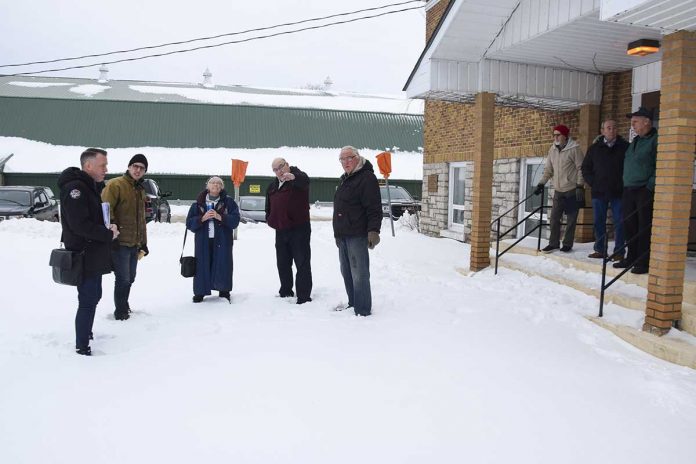LITTLE CURRENT—Last Wednesday, January 22, Rainbow District School Board (RDSB) members of the Elementary Teachers’ Federation of Ontario (ETFO) took to the streets in a one-day strike, attempting to put pressure on the provincial government to resume contract bargaining talks.
“If we had the choice between being out here (on the picket line) or with our kids, we’d pick the students every day. Strike action is never what we want to have, but there doesn’t seem to be any other way to bring the government back to the negotiating table,” said ETFO Rainbow Teacher Local open representative Heather Jefkins, who teaches Grades 3/4 at Assiginack Public School in Manitowaning.
Manitoulin Island teachers united in Little Current for the one-day strike last Wednesday. They set up along Manitowaning Road, with their main base stationed at the Little Current-Howland Recreation Centre and some picketers walking as far north as the main intersection of Meredith Street and Highway 6.
“We’ve had lots of honking, people who have rolled down their windows to cheer us on; there’s a lot of positive feedback from the community,” said Ms. Jefkins.
Across Ontario beginning on Monday, January 20 and continuing through this week, members of ETFO began staging one-day walkouts that rotated to various school boards within the province. These walkouts continued into this week and are expected to keep happening for the foreseeable future.
January 22’s job action involved ETFO members within the RDSB as well as Thames Valley District School Board in London and the Rainy River District School Board that includes nearly 11,000 square kilometres near Fort Frances.
On Manitoulin, rather than forming small strike groups at the four RDSB schools across the Island, teachers instead grouped together in Little Current for the day’s activities. Assiginack Public School and Central Manitoulin Public School teachers took the morning shift while Little Current Public School and Charles C. McLean Public School teachers assumed the afternoon stint.
“The ministry is not coming to the table to bargain with us,” Ms. Jefkins said. “Our negotiating teams are ready to deal with the issues like violence in the classroom and continuing the current Kindergarten model of a teacher and DECE (designated early childhood educator) providing learning for our youngest students.”
The latest public communication from the provincial education ministry about the ETFO job action was on January 9, when Education Minister Stephen Lecce called for an end to the escalation and games he described as union-driven.
“We will uphold our commitment to parents to stay at the bargaining table and work as hard as it takes to reach a deal that keeps students in class,” said Minister Lecce’s statement.
The last time ETFO met with the province to negotiate was on December 19, 2019. ETFO stated in a press release about the job action that the union has suggested revised proposals in late December relating to key issues, but it has not received a response.
On January 15, Minister Lecce announced plans to offer parents up to $60 per day, depending on the age of a child, to help cover childcare costs.
Based on ETFO information sheets, the union’s teachers and occasional teachers are seeking class size caps for all grades, more support for special education, increases to salaries and benefits, changes to substitute teacher hiring practices, improvements to health and safety protection and workload and working condition improvements.
For professional support personnel (PSP), education support personnel (ESP) and DECEs, the bargaining goals are nearly identical but include a reduction in Kindergarten class size caps and an increase in job security.
“We all support our children. None of us took jobs in schools just for a lark; we truly care about education and providing the same opportunities that we had when we were students,” said Ms. Jefkins.
Some of the concerns over special education funding are fallout from changes to Ontario’s autism program. Last year, the government first announced it would only partially fund autism therapy services for people under the age of 18, though it later softened that policy to return to a needs-based program.
If families could not pay for their coverage of full autism therapy, their children would have no choice but to attend standard public schools, where they would need the services of special educators to ensure they have the best possible future potential.
“We shouldn’t be balancing the budget on the backs of our children,” said Ms. Jefkins. “Our kids deserve attention and support. If you have more students with fewer caring adults, it means more stress on the system. You’ll have fewer people trying to do the same amount of work.”
In Ontario elementary schools, class sizes in Kindergarten are capped at 29 students and primary classes are capped at 23 students. However, for junior and intermediate levels (Grades 4-8), class sizes are restricted to an average of 24.5 students, distributed throughout the board. RDSB has a unique class size average for these grades at 24.1.
If this job action tactic of rotating one-day strikes sounds familiar, that may be because the Ontario Secondary School Teachers Federation (OSSTF) has also been hosting rotating strikes on a weekly basis, beginning with a province-wide one-day strike on Wednesday, December 4, 2019. RDSB teachers under the OSSTF District Three took part in a second one-day strike on Wednesday, January 15.
The main difference between the strike conditions in December to now is that formerly, just one union was taking part in job action. Now, in addition to OSSTF and ETFO hosting rotating strikes, the Ontario English Catholic Teachers Association and l’Association des enseignantes et des enseignants franco-ontariens are also taking part in job action.
The Catholic teachers’ association held a one-day, province-wide strike on Tuesday, January 21 and the French union has been working to rule since January 16.
This is the first time since 1997—more than two decades—that four teachers’ unions in Ontario have engaged in job action at the same time.
No talks are currently scheduled between the province and its various sparring unions. ETFO has announced its rotating strikes will continue through this week, possibly extending further if no progress comes forth from the presently stalled bargaining process.
“If I could talk to Minister Lecce, I would say we need to get back to the bargaining table and make decisions that will allow us to ensure we’re providing a safe and nurturing learning environment for our kids,” said Ms. Jefkins.





